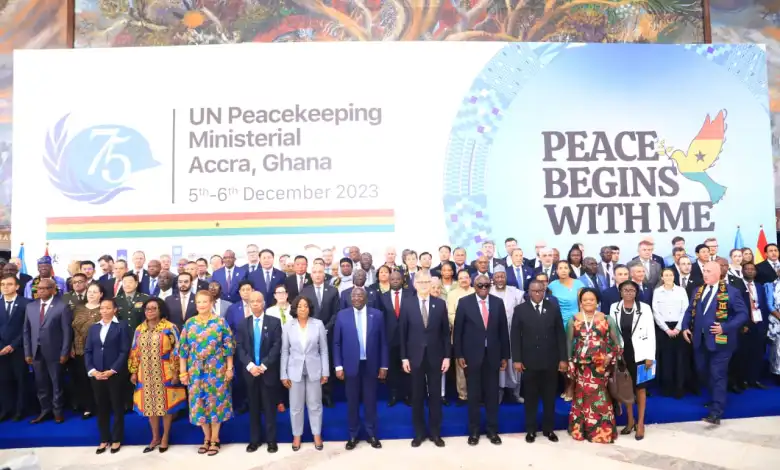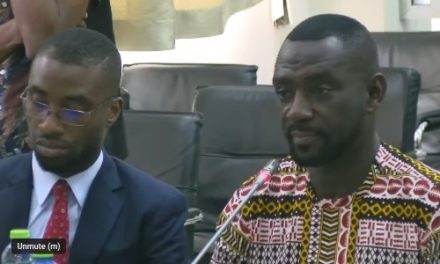
57 Countries Make New Pledges To Strengthen Peacekeeping Operations4 min read


Ninety-one member states and three international organisations expressed their collective commitment and political support to United Nations peacekeeping at the 2023 ministerial, which concluded in Accra, Ghana on Wednesday (6 December).
At the first peacekeeping ministerial held in Africa, 57 member states announced new pledges to meet current and future challenges and needs, in line with ongoing reform under Action for Peacekeeping and A4P+, key priorities to improve peacekeeping effectiveness.
“The concrete pledges generated by this historic event will provide the cushion UN peace operations require to execute complex mandates in complicated environments,” said Ghana’s Minister for Foreign Affairs and Regional Integration, Shirley Ayorkor Botchwey.

“We are grateful to the Republic of Ghana for hosting this Ministerial and their ongoing contributions to UN Peacekeeping. As missions navigate unprecedented challenges, the political support and concrete pledges received today will help strengthen our effectiveness,” said Under-Secretary-General, Jean-Pierre Lacroix.
“Ultimately, the goal of peacekeeping is to help parties end conflict by securing and implementing peace agreements and related political processes. In a world that is more divided than ever, the united and active engagement of Member States in this process is critical,” he added.
The ministerial produced significant new commitments in high-need areas, such as aviation and infantry units, including quick reaction forces and rapidly deployable units to help our missions become nimbler and more robust in responding to threats. Member states also pledged reconnaissance and critical enabling units, such as Explosive Ordnance Disposal units. Together, these specialized capabilities will contribute to the protection of civilians and improve the safety and security of peacekeepers.
These include:
• 33 Member States made pledges of over 110 new military and police units to UN peacekeeping.
Partnerships, through training and capacity-building of troop and police contributing countries, were also a key commitment from many Member States.
• 45 Member States pledged specialized trainings on an array of critical issues such as peacekeeping-intelligence, protection of civilians, gender responsive leadership and the prevention of Sexual Exploitation and Abuse.
In line with the meeting’s core themes, Member States recommitted to deploying more women in peacekeeping operations, including in leadership roles. Pledges were also announced to improve environmental management of missions by harnessing new technologies and switching to renewable energy as well as leaving a positive environmental legacy in host countries. In addition, Member States provided new support to strengthen mental health services for uniformed peacekeepers, the digital transformation of peacekeeping and resources to bolster strategic communication and address mis- and disinformation.
• 14 Member States made environment related pledges, including to deploy with or help other countries deploy with renewable energy.
• 12 Member States made pledges to support the UN’s strategic communications efforts, including resources to address mis- and disinformation.
“I congratulate the Government of Ghana on the resounding success of the Peacekeeping Ministerial. I am particularly grateful for wide ranging pledges from those that strengthen partnerships to build the capacity of uniformed peacekeepers to others that improve our logistics and health support as well as reduce our environmental footprint in the field. It underscores the pivotal role that partnership plays in UN peacekeeping. We are fully committed to do our utmost to support member states in implementing their pledges to make peacekeeping more effective, efficient and impactful,” said Under-Secretary-General for Operational Support, Atul Khare.

“Every peacekeeper must serve with honour, upholding our standards and the reputation of the United Nations. This is an essential requirement for acceptance by local communities and to effectively implement our mandates. We work in close partnership with troop and police contributing countries to ensure those standards are met, and I thank all Member States who pledged their commitment to work with us to manage the risks of sexual exploitation and abuse, in particular, with a focus on prevention. I also thank those Member States who have voluntarily contributed to the Trust Fund in Support of Victims of Sexual Exploitation and Abuse and welcome any further contributions,” said Under-Secretary-General for Management Strategy, Policy and Compliance, Catherine Pollard
At the closing on Wednesday, Ghana passed the baton to Germany, who will host the next UN peacekeeping ministerial in 2025.
“The relationships formed and the commitments made during this Ministerial Meeting are not transient; they are seeds planted for a more peaceful and secure world, the harvest of which we will reap in the years ahead,” said Ghana’s Minister for Defence, Dominic Nitiwul.
More than 70,000 peacekeepers, who currently serve in 12 missions around the world, are helping to save lives, prevent conflict and creating conditions for lasting peace.


















